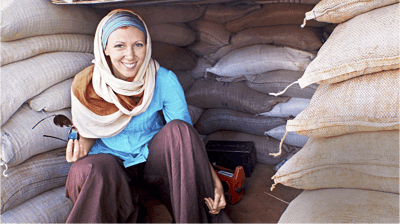Former hostage, Jessica Buchanan, recounts her kidnapping and says employers must take their employees’ security concerns seriously.
Jessica Buchanan firmly believes that duty of care must be a top priority for employers, especially as employees travel around the world on work—sometimes, like she once did, to unsafe locations. Buchanan, who was kidnapped at gunpoint by Somali pirates while on a work mission in 2011 and held hostage for 93 days, says it is equally important that employers give serious consideration to their employees’ security concerns when making travel decisions.
The Importance of Duty of Care
“Duty of care is something that really needs to be taken seriously, and it is a conversation that needs to be had more and more,” said Buchanan. “I am a huge advocate for that in terms of personal security and safety for staff.” Buchanan participated in a webinar hosted by Global Guardian on May 16.
Mike Coleman, Senior Vice President, Strategic Partnerships, Government & Corporate Solutions at Global Guardian, moderated the discussion. Global Guardian, Coleman said, provides a one-button solution to help clients fulfil their duty of care obligations. “We believe that duty of care is not just about crisis readiness and business protection, but about the well-being of employees on a daily basis,” Coleman said.
“We believe that duty of care is not just about crisis readiness and business protection, but about the well-being of employees on a daily basis.”
Global Guardian’s international network of teams has most recently assisted clients caught up in violence in Mexico, unrest in Peru, the crisis in Sudan, and the war in Ukraine.
Jessica Buchanan’s Story
Buchanan and her Danish colleague, Poul Hagen Thisted, were kidnapped at gunpoint while they were traveling in a car near Galkayo in north-central Somalia on October 25, 2011. At first, she hoped it was a carjacking, but it quickly dawned on her that she was being kidnapped. The next day she woke up into what she describes as “my own personal hell”—the start of 93 days of captivity. Buchanan was forced to live outdoors in deplorable conditions, starved, and terrorized by her captors.
In conversations with her captors, Buchanan made up the fact that she was a mother and had a son. Describing this strategy as a “stroke of genius,” she said: “My intuition knew that if I could place myself and identify myself in a maternal way then that could possibly protect me.” She thinks this was a reason why she was not assaulted by her captors. “There were certainly many of them who just saw me as a dollar sign,” she conceded, “but many of them were able to see me as a mother.”
“My intuition knew that if I could place myself and identify myself in a maternal way then that could possibly protect me.”
As Buchanan fell dangerously ill, U.S. President Barack Obama ordered her rescue. She and Thisted were rescued by the elite SEAL Team VI—the same team that killed Osama bin Laden—on January 25, 2012, near the town of Adado in north-central Somalia.
Following her release, Buchanan participated in the Department of Defense’s Hostage Reintegration Program. The goal was to help her reintegrate with her family and society, but Buchanan struggled. “There were some really dark days woven into what I call surviving survival,” she said. “It was a very lonely experience.”
The Threat of Kidnapping By the Numbers
According to the James W. Foley Legacy Foundation, started in honor of the U.S. journalist who was kidnapped in Syria in 2012 and killed by ISIS in 2014, “More and more countries are unjustly detaining Americans overseas. The trendlines for both new incidents of Americans detained and held hostage overseas and the overall number of cases globally have significantly increased over the past decade.”
“Designated terrorist groups and other militant groups, combined, account for over half (58%) of the kidnappings of U.S. nationals,” according to the Foley Foundation. The foundation’s 2022 report found that the majority of U.S. nationals have been abducted in 10 countries, including Iraq, Nigeria, Yemen, and Afghanistan. “Despite this, U.S. nationals have been taken hostage by non-state groups in more than 30 countries around the world,” it added.
It is not just terrorist organizations that are taking U.S. citizens hostage. Foreign governments, too, are detaining U.S. citizens to secure political leverage against the United States. “From 2012-2022, an average of 34 U.S. nationals were wrongfully held by foreign governments each year. This number represents a 580% increase from the average number of five U.S. nationals held each year from 2001-2011,” according to the Foley Foundation. The report notes that over 60% of the U.S. nationals wrongfully detained abroad have been held by Iran, China, Venezuela, North Korea, Syria, or Russia.
Rob D’Amico, former FBI Deputy Operations Chief of the Hostage Rescue Team, discussed the types of kidnappings, which range from short or express kidnappings to hostage taking. D’Amico was involved in Buchanan’s rescue in 2012.
KEy TAKeaways
|
STANDING BY TO SUPPORT
The Global Guardian team is standing by to support your security requirements. To learn more about our Duty of Care membership and kidnap, ransom, and extortion capabilities, complete the form below or call us at + 1 (703) 566-9463.



